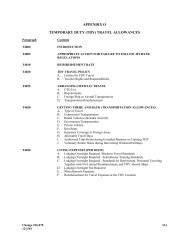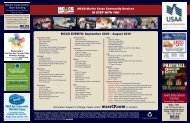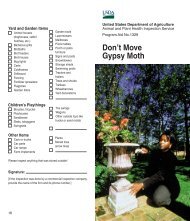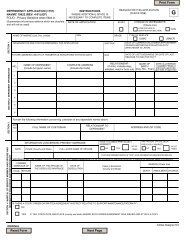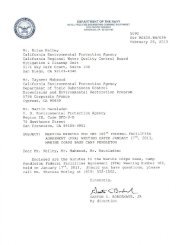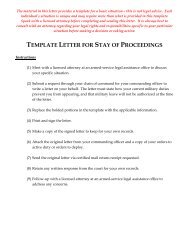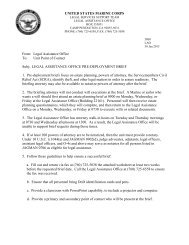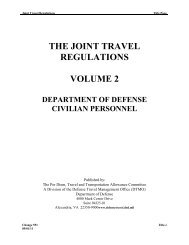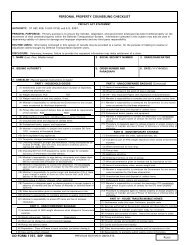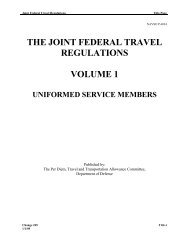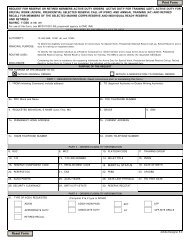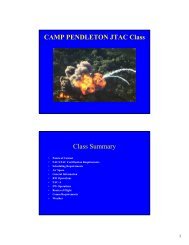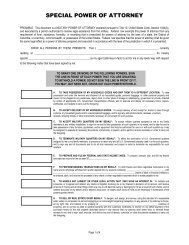bo 3500.1n - Marine Corps Base Camp Pendleton
bo 3500.1n - Marine Corps Base Camp Pendleton
bo 3500.1n - Marine Corps Base Camp Pendleton
You also want an ePaper? Increase the reach of your titles
YUMPU automatically turns print PDFs into web optimized ePapers that Google loves.
BO 3500.1N<br />
25 Mar 08<br />
5090, or by contacting the Environmental Training Branch at (760) 725-7308/<br />
7309.<br />
3. Environmental Documentation. Provided MEU and smaller size units use the<br />
training areas and ranges for the purposes specifically outlined in this<br />
Order, and strictly adhere to the environmental restrictions associated with<br />
each range, submission of environmental documentation is not required.<br />
Exercise commanders shall coordinate with the AC/S, ES to determine the level<br />
of environmental documentation required for exercises larger than a MEU in<br />
size, and when environmental restrictions in this Order conflict with<br />
training requirements. The following is the coordination lead time recommended<br />
for those actions requiring formal environmental documentation from<br />
the AC/S, ES.<br />
a. Company size 60 days<br />
b. Battalion size 90 days<br />
c. Regiment size 120 days<br />
d. Larger than regiment 150 days<br />
4. Wetlands. Wetlands are found throughout <strong>Camp</strong> <strong>Pendleton</strong>, typically in<br />
valley <strong>bo</strong>ttoms, and are characterized by soil types, hydrology, and specific<br />
vegetation. Their distribution is not limited to “wet” areas. Activities in<br />
wetlands involving soil disturbance and/or fill may require a permit, and<br />
impacts to wetlands supporting threatened or endangered species will require<br />
special consultation and approval. Vehicles operating in the vicinity of<br />
wetlands are authorized year round, and shall remain on existing roads and<br />
creek crossings. Troop movement on foot is authorized year round on existing<br />
roads, trails and crossings. Off-road vehicular or foot traffic, excavations,<br />
and/or fill occurring in wetlands must be reviewed by the AC/S, ES,<br />
and receive appropriate permits prior to conducting the action.<br />
5. Vernal Pools. Vernal pools are wetlands, usually holding water for only<br />
one to four months during late winter and spring, and are known to occur in<br />
several training areas on <strong>Camp</strong> <strong>Pendleton</strong>. The highest densities of vernal<br />
pools are found in the Bravo Two, Oscar One, Oscar Two, Tango, Uniform, and<br />
Victor Training Areas; and White Beach. Many of these pools contain rare and<br />
federally endangered plant and animal species. When operating within the<br />
vicinity of vernal pools:<br />
a. Foot traffic is authorized year round. Digging, including<br />
construction of fighting positions is prohibited in vernal pools.<br />
b. Vehicle/equipment operations near known vernal pool areas shall be<br />
kept on existing roads, year round. Contact the AC/S, ES prior to conducting<br />
activities involving soil excavation, filling, or grading.<br />
c. Bivouac/Command Post/Field support (e.g., showers, messing, fueling,<br />
water purification, etc.) activities shall be kept to at least 50 meters<br />
from identified vernal pools.<br />
6. Coastal Marshes and Lagoons<br />
a. Vehicles must stay on existing roads and trails in the vicinity of<br />
coastal marshes and lagoons from 1 March to 15 September. Foot traffic is<br />
2-5



